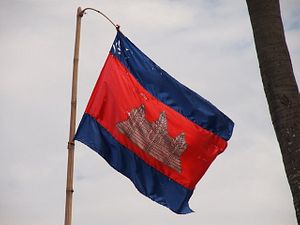Thousands of Cambodian casino workers have returned to work after rare protests and a days-long strike, deemed by the courts as illegal, won them pay rises and reinstatement of a union leader who was sacked after campaigning for a better deal.
Any signs of dissent have been rare in Cambodia since a crackdown on opposition voices and the press was launched ahead of the 2018 elections, which returned the country to a one-party state.
But workers at NagaCorp casino, the largest of its kind in the country, which enjoys a gaming monopoly within a 200 kilometer exclusivity zone around Phnom Penh, were fed up with paltry pay and launched a strategically clever industrial campaign.
Under the new deal, workers will receive pay rises of between 18 and 30 percent. That might sound generous, but to put that in perspective, workers were paid between $191 and $230 a month, while on the floor gambling staff received between $230 and $370 – which by any standards is a miserably low base. Striking workers had also complained loudly about being forced to live in dormitories and could ill-afford to have their families nearby.
Complaints were even more pointed given the enormous profits racked up by the casino, controlled by Malaysian businessman Chen Lip Keong. His worth has been previously estimated by Forbes magazine at $6.3 billion.
Additionally, NagaCorp recently announced a $4 billion expansion through its Naga 3 extension following a $390 million profit in 2018, up 53 percent year-on-year by one estimate.
Union leader Chhim Sithar – who was suspended after printing T-shirts with a Khmer slogan that translates to “The company is growing; workers need living wages” – was also reinstated, but his legal headaches are far from over.
The Phnom Penh Municipal Court issued an injunction against the industrial action following a request from the company. It also warned that any strike would be a serious offense if it went ahead. Workers ignored the injunction and thousands staged rowdy protests outside the casino during the walk off – which was largely ignored by the local press, controlled by government-friendly business interests.
Protest signs read: “Stop Discrimination Against Unions,” “Stop Exploitation at NagaWorld,” and “Demanding living wages is a right not a crime.” But according to NagaWorld the strike was indeed a crime, which it described in a statement as an “illegal gathering” of 500 to 700 staffers.
Its legal persistence resulted in the courts ordering an investigation into NagaWorld’s union leaders, including Chhim Sithar, for breaching its order. Several are reportedly facing contempt of court charges, which if successful would dampen their rare victory.
The pay rises won by casino workers could also embolden others to follow suit, particularly the garment industry, which is under threat of losing trade preferences from the European Union, in retaliation to allegations of rigging at the 2018 ballot.
A decision on the Everything But Arms (EBA) deal – where tariff-free access to EU markets is granted in return for a country meeting human rights standards – is expected next month.
However, any gains on the industrial front are unlikely to improve Cambodia’s ever-widening wealth gap between ordinary Cambodians and those businesspeople who have prospered from their political connections with the ruling elites.
Cambodia’s past performance on indicators of income inequality has been quite concerning, and that performance would look much worse if the livelihoods of ordinary Cambodians were compared with those who rule.
The pay rise won by the casino workers should be a welcome benchmark for wage claims, even though NagaWorld is yet to deliver. But the courts could still prove an obstacle and the gap ordinary Cambodians must close before obtaining a livable wage still remains quite wide.
Luke Hunt can be followed on twitter @lukeanthonyhunt

































